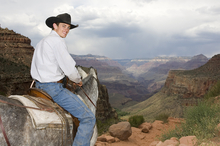Federal Highway Administration’s Recreational Trails Program (RTP), which provides funding for recreational trails throughout the country, including those used by equestrians, continues to be threatened.

Recreational equestrian trails threatened
As currently written bill would preserve RTP in name only and would effectively end the program that has funded thousands of successful horse riding trails.
In November, the Senate Environment and Public Works Committee marked up its version of a multi-year national highway transportation bill, called MAP-21. MAP-21 would reauthorize the RTP program; however it would make a major change to the RTP program by removing dedicated funding for the program and consolidating it with several others.
“As currently written this bill would preserve RTP in name only and would effectively end the program that has funded thousands of successful trail projects all over the country,” said AHC Legislative Director Ben Pendergrass.
“RTP would be thrown in with a bunch of other programs and states could choose not to spend any money on RTP projects. This defeats the original idea of RTP, which was to return some of the gas taxes paid by recreational off-highway vehicle users to the trail community.”
The current national highway bill SAFETEA-LU that authorizes the RTP program was set to expire in September of 2009. However, because Congress has yet to pass a new highway bill it has been forced to extend the current law several times, most recently until March 2012. MAP-21 must still be debated and approved by the full Senate. The House has yet to introduce its version of a highway bill.
“Every recreational rider needs to be calling and emailing their Senators to let them know how important the RTP program is to them. They need to make sure their Senators understand that RTP must have dedicated funding,” said Pendergrass.
Currently, funding for RTP is provided by taxes on fuel paid into the Highway Trust Fund by users of off-highway recreational vehicles. RTP projects consist of construction, maintenance and restoration of trails and trail related facilities as well as the acquisition of easements or property for trails.
Although each state manages its own program, 30% of RTP funds must be spent on non-motorized projects like equestrian trails, 30% on motorized, and 40% percent on multiuse projects. RTP is one of the few sources for federal funding of trail projects that are not on federal land available to equestrians. The program has been a great resource for equestrians to fund projects in their state and local parks.
The AHC, in conjunction with a broad coalition of recreational trail users, is requesting Congress re-authorize the RTP program in its current form in the next highway bill as a separate distinct program with dedicated funding. The AHC urges its member organizations and their membership to contact Congress and voice support for this program and let them know this program is important to the horse community.
